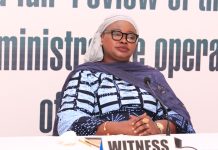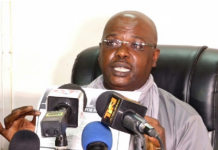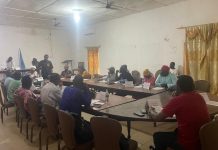In 2012, on election eve, Hon. Ousman Sillah, who was then news editor at Foroyaa, had an exclusive interview with Presidential candidate Macky Sall of ‘Benno Bokk Yakarr’, at his private residence in one of the suburbs in Dakar. In this interview, the then presidential candidate expounded on his programme and how they would address issues such as governance, employment, economic development, Casamance and international relations when elected.
We reproduce the full interview that was published below.
Q: As you await the second round of voting in the presidential election in your country, how confident are you and the ‘Benno Bokk Yakarr’ to receive the mandate of the Senegalese voters? Are you confident that the support of the other twelve candidates will make a difference to enable you win the election?
Macky Sall: Well, thank you very much. After thanking Allah and his prophet, I want to say that we are very confident the Senegalese voters will give us the mandate and with a huge majority, because we have read from the results of the first round that the Senegalese want change, as 65% of the voters have said so. We are also fortunate that all the other twelve opposition presidential candidates in the first round together with myself as the thirteenth, have come together to embark on a campaign to support my candidature for the purpose of bringing about political change in the country. With this and the blessing of Allah, I must have confidence of winning the election.
Q: We have heard the declaration you made at your last meeting that you would be implementing a realistic programme; what is this programme about and what will be your first priority if elected into office?
Macky Sall: Yes, the programme I have in place is called ‘Yonnu Yokute’ (the path to development) which I presented at the first round of the presidential election and which has now been expanded to incorporate the ‘Assises Nationales’ (national consultation), with M23 (the June 23 Protest Movement) and all the other social forces for change. The programme adopts the conclusions of this national consultation which entails core things as its base.
The basic objectives of the ‘Yonnu Yokute’ programme are: to remove the differences among the Senegalese population by reducing the gap between the rich and the poor, as the gap is extremely wide in Senegal where you have those people who are extremely rich and those who are extremely poor. We believe that this gap should be reduced to bring about social equity. Let us take for example the health sector in Senegal where those who are gainfully employed number only about 300, 000 in a population of 13 million, whilst the rest are struggling; a universal health care programme has to be put in place to ensure access to health care or treatment for all Senegalese including those who are even unemployed. This health care system obtains in other countries and it is called Universal Health Care Coverage. I have evaluated this and its costs about 90 billion CFA or 130 million Euros and it can be instituted in the first year. In the second year, we can organize the pharmacists, drivers and other social categories to form economic cooperative groups (mutuelles). These will be part of our social programme. The students from extremely poor families will be provided with a scholarship amounting to 100,000 CFA annually, which is a modest but an important intervention for children from such families. We will also increase 20, 000 CFA on the earnings of pensioners every two months. However, the most important thing is to reduce the prices of basic food commodities such as rice, cooking oil, sugar, etc., which are very exorbitant in Senegal. The other equally important aspect of our programme is to guarantee the base for development. When you talk about the economy and development in a country, there shouldn’t be marked disparities within and among the regions constituting it. For example, having schools, hospitals and other social amenities in some regions and whilst there are none of these facilities in the others. Therefore, we will ensure that boreholes, water, electricity, roads, etc., are made accessible to the larger population.
The third aspect is about employment. We need to develop the economy to provide employment for the people. When we talk about underdevelopment, it means a country where everything consumed by its people is not locally produced; even a sewing needle is imported from abroad. Even if you look at what we eat on the table, about 78% of it comes from the outside. The programme seeks to develop and transform our agriculture to guarantee food self-sufficiency in cereals such as rice, millet, maize, melon, etc. We envisage great strides in this area to strengthen agriculture in the rural area, animal husbandry for the production of meat and dairy products, the tourism sector and many other areas of economic activity
Fourthly, the programme seeks to strengthen democracy which is very important as there cannot be any development in the absence of democracy. We want Senegal to operate a democracy and promote good governance. This democracy will elaborate how one assumes and leaves office, it will clearly stipulate the mandate and eliminate self-perpetuating rule and put in place a term limit for the presidency. This is why I have declared that when elected into office as the next president of Senegal, I will reduce the seven years mandate to five years. We will write a new constitution. One has to show leadership by example and this is the reason why I have offered to serve for 5 years instead of the seven years required by this current constitution. We will develop a new constitution with guarantees to make it impossible for any president not to be mad enough to attempt to tamper with it, in order to perpetuate himself / herself in office. One would not dare to extend one’s mandate beyond the constitutional requirement in a country like France or the USA. Although this is a process, Africa should also strive to reach this stage.
The fifth priority of our programme elaborates on peace, security and integration.
Senegal has a serious and difficult problem in its Casamance region. For thirty years we have been fighting there and I intend to appeal to the Gambia and its President Yahya Jammeh and to Guinea Bissau if we assume office, for them to help in the process of finding solutions that will bring about lasting peace in this part of Senegal. If there is no peace, none of the economies of these countries will function normally. Hence every one of us has an interest and stake in ensuring peace in Casamance. We will do every thing possible with goodwill, to ensure that peace returns in Casamance. This is why I have decided that my first official visit outside after assuming office, would be The Gambia and Guinea Bissau. These countries are our immediate neighbours and we share everything in common, blood ties culture, languages, history and everything. Hence peace and cooperation should exist between and among us.
In a nutshell, this is basically the programme we are presenting to the Senegalese voters for them vote for and which we envisage to implement if elected into office.
Q: What role do you think the Gambia can play in the Casamance situation?
Macky Sall: Gambia can play a very big role in it as it happens that it shares a border with Casamance. If you look at North Casamance and Southern Gambia, they are almost the same; the border straddles the Sindian zone. As a matter of fact, with the influence that President Jammeh has, he can help us talk with our brethren in the rebel camp to accept a ceasefire. In essence, we ought to know that positive things are possible in a climate of peace. We need to sit together and discuss about solutions on how to bring about peace and to re-deploy and integrate them into normal life after foregoing the fighting. In all the countries that had experienced war, the final option is always a negotiated solution and for a new page to be opened for development to take place. Casamance needs development and everybody needs it.
Q: Still on Casamance, are you also considering the possibility of exploring a political arrangement such as the one in Nigeria, the federal system of governance? Considering that Nigeria has such a huge and diverse population grouping and in the quest to preserve its territorial integrity and promote national unity, it has opted for this federal system. Will your government consider this form of arrangement for the country?
Macky Sall: Well, you see every country has its own history. You cannot just copy a model that exists elsewhere and apply it to your own situation. Nigeria has its own peculiarities, as it is constituted by different states with a population of more than 100 million and with integration problems such as north / south or Muslim / Christian complications. Our country is not like that. Although Casamance has its own peculiarities, so too is Futa, Kedougou, etc. Normally, we have to sit together to look at the real problems and agree on common solutions. We cannot say anything now but Casamance needs to be developed with tangible investments that will revitalize economic activity and productivity. The Gambia can even help in this direction regarding to having a bridge at Farafenni (Trans-Gambia). This serves the interest of both The Gambia and Senegal.
Q: What do you think are the advantages and disadvantages to the two countries of having the Trans-Gambia crossing bridged?
Macky Sall: The advantage is that those who have been paying to cross the ferry will still continue to pay to cross the bridge. The long delay of having to wait for five or six hours to cross with the ferry, is not good for economic operators and activities and having the bridge in place will make this history. I believe that when I discuss with my Gambian brothers, we will be able to find solutions. All this depends on trust and confidence. If the accords are based on sincerity, trust and confidence, we will be able to put in place something that serves the interests of our two countries and peoples.
Q: Finally, what role do you see for Senegal in ECOWAS, AU and the United Nations if you are elected?
Macky Sall: Senegal, although a wide territory, is not a small country in terms of economic power. However, it was blessed with having built a very strong diplomacy in international relations. It is a country that is endowed with great minds who are intelligent and prudent.
Senegalese are serving in many international organisations ranging from the ECOWAS, AU, UN and many others. This is due to the competence of her nationals and it has been there at the time of Senghore, Diouf and Wade. I believe this role should be re-assumed and should start from developing good relations with our neighbours such as Gambia, Guinea Bissau, Guinea Conakry, Cape Verde, and then transcend to the other countries like Cote D’Ivoire, Sierra Leone, Nigeria etc. Our role in Africa in the area of regional integration should be stepped up. We are interested in issues such as the United States of Africa and would want to know how far efforts have gone towards this direction. We would want to promote the issue of economic integration of Africa as a priority. As Africans, we would want the continent to have one voice on matters that are of interest to the African people.
As for the United Nations, there is need for it to be reformed. The present structure of the UN came about after the Second World War, as a result of the dictates of the victors but the world has changed now and the nature of the organization should reflect this new reality. After 60 years of its existence, the organization should review the way it operates particularly the Security Council. In this regard, Senegal will continue to play its role in these organizations.
Q: Thank you very much for the interview.
Macky Sall: Thank you.




















